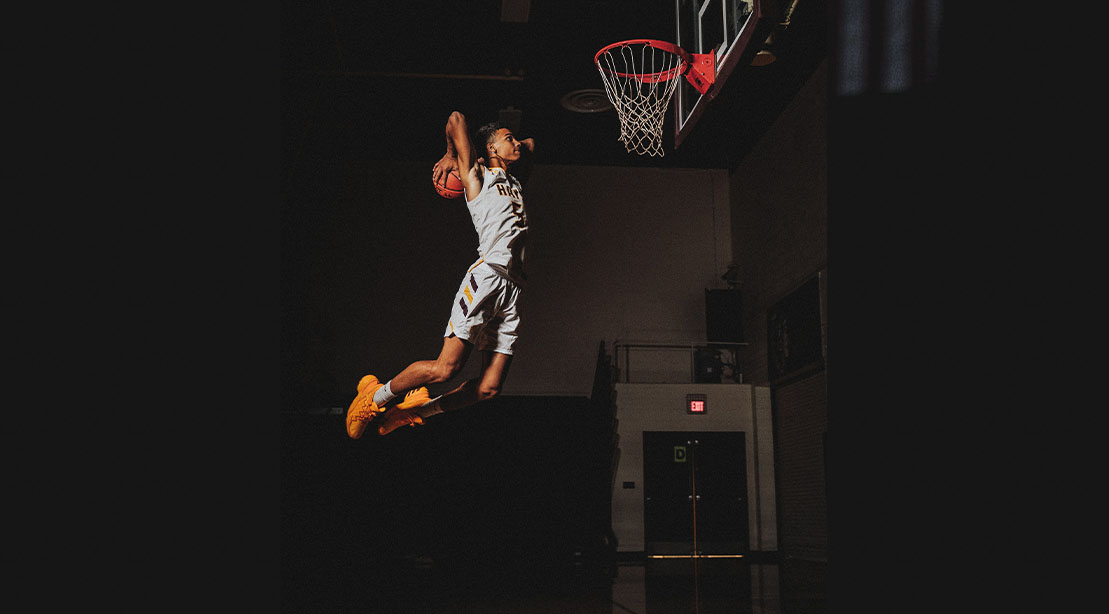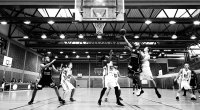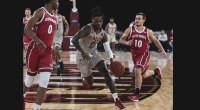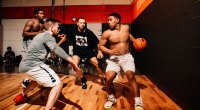28-Days-to-Lean Meal Plan
With the right plan and the right discipline, you can get seriously shredded in just 28 days.
Read article
If you have ever watched a basketball pickup game or a college or NBA game, it is easy to marvel at the players’ athleticism as they jump out of the gym and change direction at the drop of a hat. Some with blessed genetics can do this, and some can do it at a high level, but I will most certainly bet that your favorite player incorporates strength training in their workout for basketball players.
There was a train of thought that basketball didn’t need strength training in the fear of getting too big and bulky and slowing them down. When you have most of the tools to be a good basketball player without strength training, why would they bother? They’d go and play more basketball and not give the weight room a second thought except for biceps curls.
But with the rise of the modern NBA with athletic and strong basketball players, you will get left behind if you don’t strength train along with practice. Muscles, bodying, and overpowering your opponent shouldn’t be the only reason for strength training, but it’s a start.
Here, we’ll understand why strength training matters for basketball with Cristian G. Plascencia, CSCS, a strength coach for Texas Pro Academy.
Including strength training exercises in the workout for basketball players is critical because it impacts and improves various skills needed to be a top player, including jumping power, speed, change of direction, and conditioning.
“Basketball players play a very dynamic and agile sport. Players will start in their youth/adolescent years and play all year with their school and club teams, which places a sizeable elastic stress on their connective tissues like tendons and ligaments,” explains Plascencia.
Is strength training excellent for basketball injury reduction? You bet your bottom dollar. But here are three critical performance factors that strength training improves.

Basketball is a plyometric sport, and it’s all about jumping power and the repeatability to do it again. The higher a player can jump, the better the chance of a highlight reel dunk or skying for a rebound. Not only once but again and again. A jumping or plyometric program is essential, but having a strength base makes this all possible. The stronger you are, the bigger your potential to express power and not get hurt doing it.

Basketball is a fast-paced forth game that requires quick direction changes because of the end-to-end action and the ability to get around the opponent. Stopping on a dime and the speed and quickness needed to evade opponents and score is made better by strength training. The better a player can absorb force, stop, and change direction on a dime, the need stronger muscles and connective tissues to make this happen, explains Plascencia.
“From an improved output perspective, by progressively dosing strength training into their weekly routine, athletes can produce more force into the ground, which will help drive power outputs on the court.”
A well-programmed strength-training program also improves leg strength, leading to faster sprints on-court. The bottom line is that even one blessed with great genetics and strength training will improve them, and Lebron James is exhibit A.

If you don’t have any gas in the tank, you will not last long on the basketball court. Many players think playing basketball is a great way to get in shape. Still, it’s better if you are conditioned in the beginning. If you have watched a 4th quarter comeback when one team overruns another, you’ll know how important being conditioned and having great stamina is.
Conditioning drills combined with strength training, especially high-intensity interval training (HIIT) kind, will improve cardiovascular and muscular endurance and prepare you for basketball’s rigors and that’s exactly what you should be looking for in your workout for basketball players.
“For all this constant fast-tempo pulling on the muscle-tendon unit (ligaments and tendons), basketball players must expose themselves to heavier, slower forms of stress in max effort and dynamic strength training. This slower form of force production allows the tendon to “stiffen” and “shorten/tighten up, ” allowing the tendon unit to stay resilient for years. I love having phases of max effort, heavy strength training with lunges, trap bar deadlifts, and RDLS. Then, I will progressively shift into a more dynamic training effort where we are attempting to move weights at a moderate intensity but extremely fast and with a high intent to move quickly.” says Plascencia.
A1. Trap Bar DL – 5 x 3 reps – (80-85% RM)
A2. Band pull-aparts x 12 reps
Rest 2 min b/w rounds
B1. SA DB Lateral Box Step Up – 3 x 6 reps.
B2. Nordic Proximal Curls – 3 x 5x
Rest 60s b/w rounds
C1. Heavy Sled Push x 30 steps – 3 sets
C2. SA Suitcase Staggered RDLs 3 x 8 each Leg
Rest 60s. B/W rounds